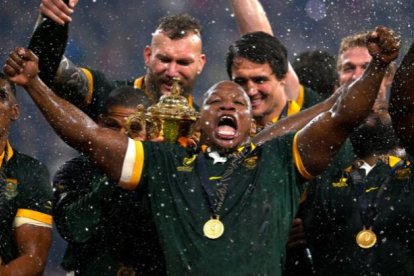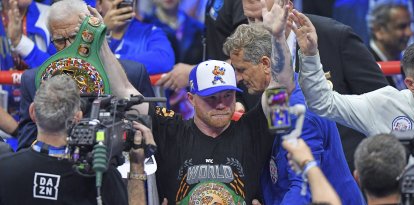Rugby World Cup: South Africa defeats New Zealand in a final for the ages
The Springboks beat the All Blacks 11-12 in a nail-biting match.

(Cordon Press)
With a great display of superior play in the first half and an incredible capacity for suffering in the second half, South Africa became the rugby world champion for the fourth time in history against a combative New Zealand, who could have triumphed if not for their unforced errors, especially during the first 40 minutes.
It was South Africa that took control of the game in the first half. The brand new world champion for a second time running, positioned themselves in the New Zealand field from the first stages of the match, with Pollard scoring points with kicks from favorable areas.
In fact, New Zealand has rarely been seen playing as uncomfortably as they did in the first half of the final, as Shannon Frizell's early yellow, two minutes into the match, directly influenced the development of the match.
The All Blacks played practically outnumbered for 80% of regular time, as even their captain, Sam Cane, made the grave mistake of tackling above the regulation zone, earning himself a permanent expulsion. Throughout all of this, South Africa imposed the conditions of a very physical game in the central zone and managed to position the ball in the outer lanes with very quality foot passes.
Still playing 14 against 15, New Zealand resisted the South African siege and prevented the Africans from scoring tries throughout the first half. Pollard scored four three-pointers to reach twelve points, but as the game progressed, the Oceanians settled. They gained ground, handled possession and had two three-point conversions 12-6 at half-time, and considering the South African superiority, was a great deal.
The All Blacks nearly glorious comeback
In the second part, the story was different. South Africa, conservative throughout the first half by going to the woodwork in each fruitful possession, went out to look for the early try to seal the end as soon as the second half began. They were very close, but New Zealand withstood the siege and, based on their own rebellion and quality in attack, added to the yellow card of Siya Kolisi, who left the team with 14 players for 10 minutes, the All Blacks began to attack the South Africans.
In fact, the New Zealanders positioned themselves in the South African field for several minutes, taking the ball to the last third of the field and, finally, they managed to break the resistance through Mo'unga, who put together a play and assisted Smith to close a try that everyone shouted about in the Stade de France.
However, due to a controversial touch forward at the beginning of the play, the six-point play was nullified.
The situation did not stop the All Blacks, who returned to the charge on the left, and, through Mark Telea, who played a memorable game, they achieved the long-awaited conversion completed by good Beauden Barrett.
The game was 11-12, the additional point needed to be converted, but the New Zealanders failed as Mo'unga could not consecrate his great game from a very corner position.
New Zealand missed not only the conversion point but also a long-distance kick to put the game at 14-12, at the feet of Beauden Barrett himself, who had enough power but failed to find the right direction.
In general, in a historic final defined in the details, South Africa had a little more sacred fire than New Zealand. The South Africans had quality and superior play in the first half and also a bit of luck in key moments: referee decisions, loose balls and close plays. In the end, it was a similar situation to the quarter-final matches against France and the semi-finals against England, where the Springboks also won by one unit.
Recommendation





















